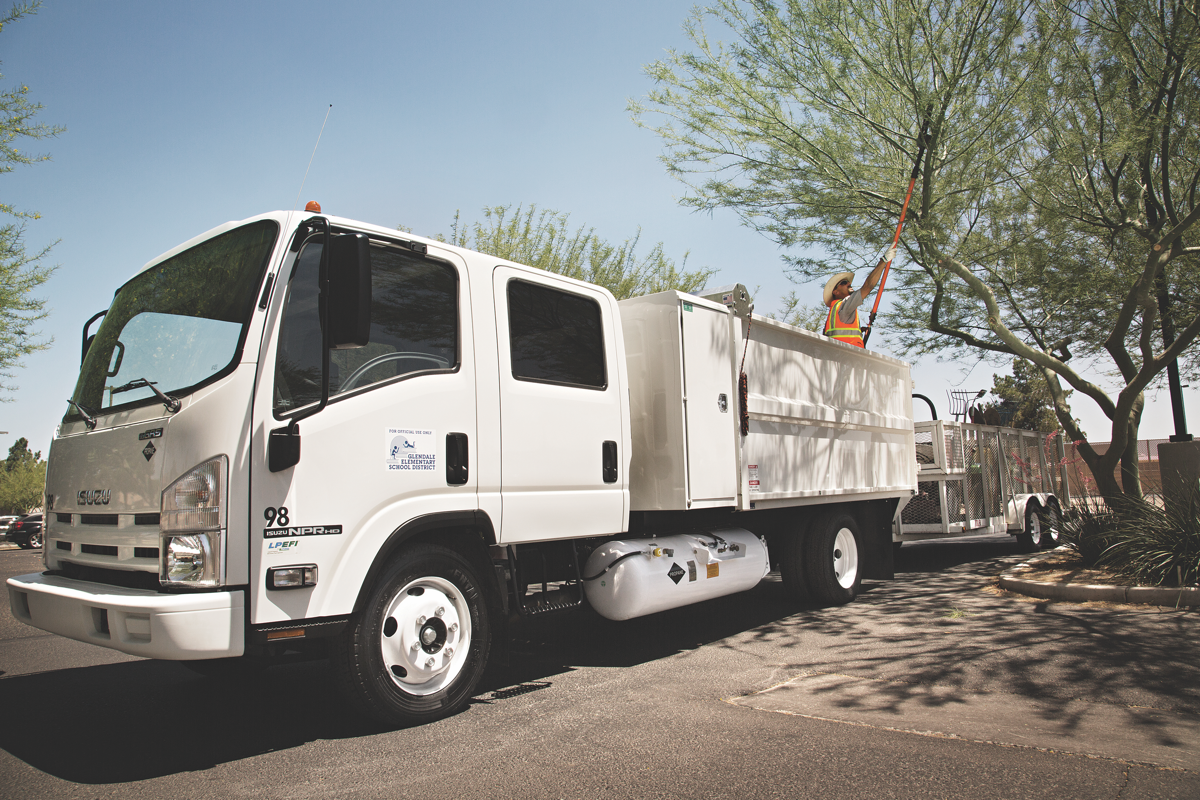Fuel Your Fleet with Propane
Propane autogas has the power to transform your fleet.
Businesses and government organizations of all sizes have discovered that Propane Autogas vehicles deliver the lowest total cost of ownership of any fuel.
If you're looking to make an impact on your bottom line, explore the possibilities of Propane Autogas.
Easy Refueling
You have several convenient refueling infrastructure solutions to choose from, depending on your fleet's size. Quick-Connect nozzles make the process even easier — your drivers just click in the nozzle, refuel, and go.
While diesel engines spend valuable time in the shop for repairs on complex emissions systems, propane autogas vehicles keep your business running with reliable operation.
More Uptime
You have the power to cut the harmful emissions around your community. Propane autogas vehicles cut significantly more NOx and greenhouse gas emissions compared with diesel and gasoline.
Cleaner
From light- and medium-duty vehicles to buses, propane autogas fleet vehicles are trusted to get the job done. These vehicles feature proven technology that's trusted by fleets across the U.S.
Proven
Frequently Asked Questions
-
Propane engines are spark-ignited, internal combustion engines designed much like gasoline vehicles. There are two types of propane engines: Dedicated (100% propane) and Bi-fuel (50% gasoline, 50% propane).
-
A Dedicated Propane Engine is an engine installed in a vehicle so that it runs solely on propane and can be ordered or purchased straight from the manufacture or your local dealership.
-
A Bi-Fuel Propane Engine is an engine installed in a vehicle where it runs on propane and the original fuel (gasoline). Vehicles can be converted by a qualified system retrofitter (QSR) to light, medium, or heavy-duty vehicles and can be as quick as one day to install.
-
The most common systems are the vapour sequential injection and iquid injection systems. The Vapour sequential injection system injects the fuel in a gaseous phase but aligns the gas injections to what the original electronic gasoline controls of the car command. The Liquid injection system exactly replicates gasoline systems and injects the fuel in a liquid phase without prior vaporisation. This enables more precise metering of the fuel and an injection timed to the opening of the intake valves.
-
For newer vehicles, the conversion kit must be EPA certified to be legal to use in the United States. Older vehicles that are more than 10 years old or have over 120,000 miles are sometimes exempt from this rule, as they are considered “beyond useful life,” by the EPA. EPA-approved kits are available for most naturally aspirated engines used in fleet vehicles, SUVs, and some passenger cars.
-
A propane vehicle’s power, acceleration, and cruising speed are similar to those of conventionally fueled vehicles.
-
Follow the manufacturer’s recommended oil change intervals, but be aware that the oil may not look like it needs changing because propane burns cleaner. The oil still needs to be changed at the recommended interval, there are necessary protective additives in engine oils that can still wear out. Some regular propane fuel users report that they can wait until 15,000 miles before needing an oil change.
-
No. Burning propane in your engine should extend its life compared to burning gasoline. Propane burns cleaner than gasoline, so there are fewer impurities in the cylinder to cause wear and the engine oil stays cleaner and lasts longer. Most fleet managers report longer engine life on their propane-equipped vehicles versus gasoline.
-
An engine that runs on propane will generally run longer and require less maintenance than running on gasoline. Propane is a lot easier to vaporize in the carburetor and propane, being gaseous at atmospheric pressure and temperatures, won’t leave deposits behind.
-
The operation with alternative fuels have no negative effects on engine wear rates and durability. Engine thermal loads are equivalent to 100% diesel operation, no excess wear of combustion chamber components.
-
Most conversion kits feature a tank specially designed to fit in a vehicle’s spare tire carrier location. If you don’t wish to sacrifice your spare tire room, extended-range tanks of 50 to 80 gallons are available for mounting in truck beds or frame mounting on vehicles that have space available for it. For vehicles converted to a dedicated propane system, a propane tank can usually be fitted where the gasoline tank was previously.
-
The pressure in the engine goes down due to the propane tank losing pressure from the lack of propane. Each injector in the engine that once ran on propane turns to run on gasoline automatically. This process does not hurt the engine while you are driving.
-
No, the manufacturer’s’ warranty is not affected when you get your vehicle converted to propane.
-
Alliance Autogas offers a 5-year / 100,000-mile warranty covering all parts of the system.
The ROUSH CleanTech propane auto-gas fuel system is covered by a limited 1-year / 12,000-mile warranty.
Check with your propane autogas manufacturer to see if they offer a warranty for the conversion system you chose.
-
The ICOM propane conversion does not splice into the factory wiring harness or fuel system at all, and will not cause any warning lights to come on. The only wiring into the vehicle is to the battery and 1 wire to a spark plug for RPM monitoring.
Since holes must be drilled into the intake manifold for injector placement, (for a bi-fuel conversion) reversing a conversion may require installing a new intake manifold or plugging these holes in some other way.
A properly installed and tuned conversion should, in most cases, not cause any trouble for a vehicle’s onboard diagnostic systems or ECM/ECU.
-
On average, a propane vehicle conversion can cost anywhere from $6,000 to $9,000 depending on the vehicle and kit installed.






